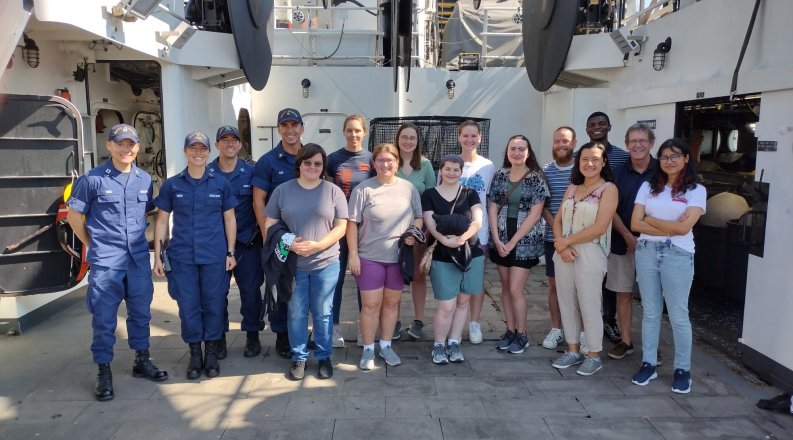By: Tiffany Whitfield
Alumnus Lieutenant Commander John Kidd serves as Executive Officer on the National Ocean Atmospheric Association Corps (NOAA Corps) Pisces ship. In 2010, he earned a Bachelor of Sciences degree from Old Dominion University’s Department of Ocean & Earth Sciences. LCDR Kidd’s life changed after he toured a NOAA Corps ship and recently, he paid it forward by inviting some OES ODU students onto the ship where he is second in command.
“As a senior undergraduate student, I was afforded the opportunity to tour the NOAA ship Thomas Jefferson, an opportunity made possible by the collaboration between Rear Admiral Shepard Smith, NOAA, Ret. and Professor Fred Dobbs,” said LCDR Kidd. During the tour, the Commanding Officer talked with the students and shared in “great detail” a hydrographic dataset and explained what it took to execute the mission. The National Hydrography Dataset represents the water drainage network throughout the United States which includes features such as rivers, streams, canals, lakes, ponds, coastline, dams, and stream gages. The complex connectedness of bodies of water and how they impact the environment appealed to LCDR Kidd. “It was at that moment I knew I wanted to become a NOAA Corps officer and to one day sail as a Commanding Officer of a hydrographic vessel,” said LCDR Kidd. “Because this one-hour tour forever changed my life, I wanted to afford the students currently enrolled in OES classes at ODU the same opportunity.”
During the two hour visit to NOAA's Marine Operations Center - Atlantic facilities, ODU OES students boarded the NOAA Ship Pisces and NOAA Ship Thomas Jefferson. Broken up into two groups, they ventured around these two ships and saw various spaces like the Mess Deck where meals are served, the Wet Lab where the bulk of the science occurs and fish are dissected, the Acoustics Lab where the ship's sonar equipment is operated, and the Bridge where the Commissioned Officers safely navigate the vessel.
Current OES student Victor Akudoro enjoyed this unique opportunity. “It was a nice and educative experience to be at the NOAA facility in Downtown Norfolk, and to tour the NOAA Pisces ship which carries out fish study research and the Thomas Jefferson ship which engages in physical oceanography and modeling analysis. The crew on both ships, were very welcoming and they gave us a detailed explanation of how the ship works and their day-to-day activities,” said Akudoro.
Seeing a research vessel of that magnitude is eye-opening, but the hopes of working on one took patience and determination for LCDR Kidd. “I've always had a deep respect for the scientific method, and I was naturally drawn to the challenge of developing the critical thinking skills needed to be an effective scientist,” said LCDR Kidd. “I also grew up on the water and knew that I wanted to make a living working on boats/ships conducting science.”
His journey from ODU to the NOAA Corps involved LCDR Kidd taking a paid internship with Earth Resources Technology as a physical scientist. “I first worked at the Atlantic Hydrographic Branch in Norfolk, VA for about six months compiling hydrographic data from NOAA ships and contract survey companies,” said LCDR Kidd. He took part in critical components in the workflow to update the nation's nautical charts for the safety of navigation. “I then sailed with the NOAA Ship Thomas Jefferson for another six months collecting hydrographic data using the ship's hull mounted multibeam echosounder, side scan sonar, and her 28-foot aluminum hydrographic launch equipped with the same survey instrumentation,” said LCDR Kidd. Following this internship, he became much closer to achieving his dream because he was accepted into the NOAA Corps and reported to Basic Officer Training in June of 2011.
He has served in NOAA Corps for 12 years with at least 8 more years to go. NOAA Corps is not the military and are not combat trained, but it is a uniformed branch of service, similar to the United States Public Health Services.
He credits his time as an undergraduate OES student. “My time spent at ODU equipped me with the baseline knowledge required to be a successful operator of NOAA’s scientific platforms (ships, small boats, aircraft, and autonomous systems),” said LCDR Kidd. The OES program helped build his STEM skills needed to become a commissioned officer in the NOAA Corps.
“ODU is special due to its strong scientific programs and its proximity to a plethora of scientific opportunities being adjacent to the Chesapeake Bay and NOAA operational units,” said LCDR Kidd.



